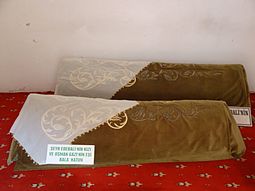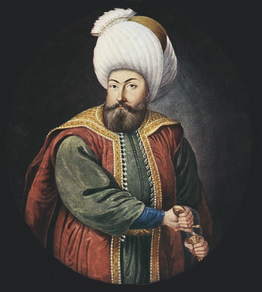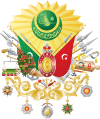Rabia Bala Hatun
| Rabia Bala Hatun | |
|---|---|
 | |
| Born | Rabia Bala Hatun |
| Died | 1324[1] Bilecik, Turkey |
| Burial | Bilecik |
| Spouse | Osman I |
| Issue | Alaeddin Ali Pasha |
| Father | Sheikh Edebali |
| Mother | Ildiz Hatun |
| Religion | Sunni Islam |

Rabia Bala Hatun (Ottoman Turkish: رابعه بالا خاتون, "spring" and "young one"; died January 1324) was the wife of Osman I, the founder of the Ottoman Dynasty. [2] She was the daughter of Sheikh Edebali and the mother of Alaeddin Ali Pasha of the Ottoman Empire.
Names
Edebali's daughter is called by different names in the sources.[3] Sheikh Edebali's daughter is referred to as "Rabia" in the history of Uric, and as "Mal/Malhun" in those of Aşıkpaşazade, Neşri, Rüstem paşa and Lütfi Paşa.
Marriage to Osman
Edebali became Osman's mentor and gave him the Gazi sword. Osman at Edebali's dergah, dreamed of a state.[4] This dream, thus led to the establishment of a state. After this, Edebali's daughter was married to Osman I.[5] As a result of this marriage, all the Ahyan sheikhs came under the Ottoman control. This had a major impact on the establishment and development of the Ottoman Beylik. From the central government records regarding the property she received at the time of her marriage; the village of Kozağaç in the district of Bilecik, where the dervish hospice of her father was located. Her father Sheikh Edebali was an influential religious leader in the Ottoman territories.[6]
Death and burial
She died in 1324 in Bilecik. Although she preceded her husband, Osman, she was buried with her father in Bilecik.[7] Bala Rabia Hatun's tomb along with that of her mother's Ildiz Hatun is a famous historical landmark found within the complex of the tomb of Sheikh Edebali.[8] This complex was built by Orhan Ghazi and later renovated by Abdul Hamid II.[9][10][11]
Issue
By Osman, she had a son:[12]
- Alaeddin Ali Pasha (c. 1281 - 1331). He was an advisor to his half-brother Orhan.
In popular culture
In the 2019 Turkish historical fiction TV series Kuruluş: Osman, Bala Hatun is portrayed by Turkish actress Özge Törer.[13][14][15]
See also
- Ottoman Empire
- Ottoman dynasty
- List of consorts of the Ottoman Sultans
- Ottoman family tree
- Ottoman Emperors family tree (simplified)
Further reading
- Peirce, Leslie P., The Imperial Harem: Women and Sovereignty in the Ottoman Empire, Oxford University Press, 1993, ISBN 0-19-508677-5 (paperback).
- Bahadıroğlu, Yavuz, "Resimli Osmanlı Tarihi, Nesil Yayınları" (Ottoman History with Illustrations, Nesil Publications) 15th Ed., 2009, ISBN 978-975-269-299-2 (Hardcover).
References
- ^ Emecen, Feridun (2023). "Mal Hatun". TDV Encyclopedia of Islam (3rd ed.) (in Turkish). Vol. Annex 2. pp. 182–183.
- ^ Akram, Uzair. "Real History of Bala Hatun in Kurulus Osman Season". historicales.com. Archived from the original on 12 May 2021. Retrieved 7 May 2021.
- ^ "Bala Hatun: Rabia Bala Hatun yahut Mal Hatun". arkeolojikhaber.com. 11 December 2022.
- ^ The Origins of the Ottoman Empire, by Mehmet Fuat Köprülü, Gary Leiser, p. 6.
- ^ "Bala Hatun kimdir? Osman Bey ve Bala Hatun'un evliliğiyle ilgili bilgiler". hurriyet.com.tr. 3 June 2020.
- ^ "Şeyh Edebalı kimdir? İşte Şeyh Edebalı'nın tarihteki yeri…". sozcu.com.tr. 25 December 2019.
- ^ "Bala Hatun tarihte nasıl öldü? Kuruluş Osman Bala Hatun kimdir, kaç çocuğu var? Türbesi nerede, hangi ilde?". aHBR.
- ^ "Kuruluş Osman Bala Hatun öldü mü? Bala Hatun mezarı nerede? Bala Hatun kaç yaşında öldü". canlihaber.com. 25 May 2022.
- ^ "Osman Gazi'nin eşi Bala Hatun'un türbesine ziyaretçi akını". HABERLER.COM. 16 December 2022.
- ^ "Tomb of Sheikh Edebali Map And Location". imturkey.com.
- ^ "Şeyh Edebali kimdir, ne zaman, nasıl öldü". ntv.com.tr.
- ^ Alderson, A. d (1956). Structure Of The Ottoman Dynasty. p. 246.
- ^ "Özge Törer kimdir, kaç yaşında? Kuruluş Osman dizisinin Bala Hatun'u…". 10 February 2021.
- ^ "Bala Hatun kimdir? Kuruluş Osman Bala Hatun'u kim oynuyor, Özge Törer nereli, kaç yaşında?". Milliyet. 19 May 2021.
- ^ "Kuruluş Osman Bala Hatun kimdir, gerçek adı ne? Özge Törer hangi dizilerde oynadı?". CNN Türk.
